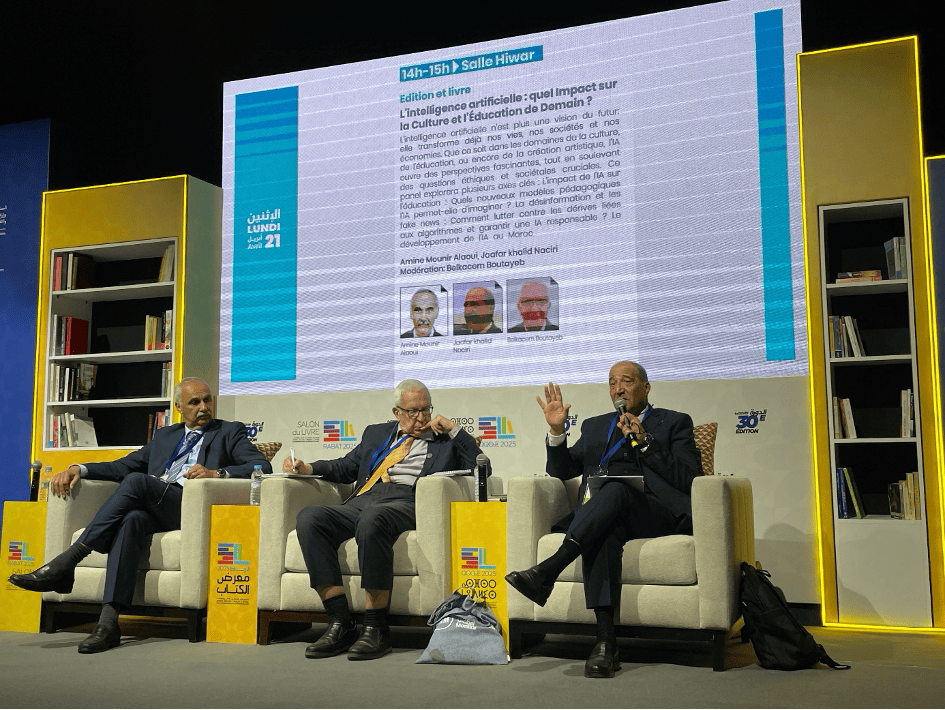
How is artificial intelligence reshaping our classrooms and cultural spaces?
That was the key question raised during a panel held as part of the International Book and Publishing Fair (SIEL). Experts from education shared insights on how AI is already transforming our lives. The session was moderated by Belkacem Boutayeb.

How is artificial intelligence reshaping our classrooms and cultural spaces?
That was the key question raised during a panel held as part of the International Book and Publishing Fair (SIEL). Experts from education shared insights on how AI is already transforming our lives. The session was moderated by Belkacem Boutayeb.

How is artificial intelligence reshaping our classrooms and cultural spaces?
That was the key question raised during a panel held as part of the International Book and Publishing Fair (SIEL). Experts from education shared insights on how AI is already transforming our lives. The session was moderated by Belkacem Boutayeb.
Artificial Intelligence (AI) continues to reshape professional landscapes, and two sectors may experience the greatest transformation: education and healthcare. Jaafar Khalid Naciri, a former university professor, emphasized the magnitude of this shift, noting that teachers and doctors are particularly exposed to the sweeping changes AI technologies bring.
In the field of education, AI is redefining traditional teaching methods. Advanced algorithms now make it possible to deliver distance learning experiences that are not only accessible but also highly personalized. By analyzing individual student profiles, AI can identify learning gaps and propose targeted interventions. These capabilities go beyond tutoring. AI can now design custom examinations, automatically grade responses, and provide instant, constructive feedback. As Naciri explained, this could significantly lighten the administrative load on educators, allowing them to focus more on pedagogy and student engagement. However, he also warned that such automation might risk reducing the teacher’s role to that of a facilitator, raising concerns about the human dimension of teaching.
In healthcare, AI has already begun to support complex medical tasks, particularly in surgery. Robots guided by AI can now assist in delicate procedures with unprecedented precision. Furthermore, medical students benefit from AI-powered simulations that replicate real-life clinical scenarios, offering them risk-free environments to hone their skills. Naciri underlined how such advancements could lead to more efficient healthcare systems, but also stressed the need for careful regulation, especially regarding patient privacy and decision-making responsibilities.
Amine Mounir Alaoui, also a former university teacher, provided a historical perspective on AI, recalling its roots in 1956. He highlighted two key reports. One from CESE on AI and another on fake news. He pointed the importance of cultural input: “AI feeds on existing data. If we don’t include Moroccan culture in that data, AI won’t reflect us.”
On the legal side, Alaoui warned of copyright concerns, citing the example of AI-generated images inspired by Studio Ghibli. He also addressed the ethical gap. Money often wins over the common good. Alaoui urged for stronger safeguards to ensure AI benefits everyone, not just those seeking profit.
The discussion also touched on international examples. A notable case was Sweden’s decision to remove tablets from schools, citing research that students were not learning as effectively with digital devices. The Swedish Ministry of Education opted to return to more traditional learning tools, underscoring a broader lesson: technology, including AI, must serve pedagogy, not replace it. The example served as a reminder that while AI offers powerful tools, its role in education must be guided by clear objectives and grounded in human values.
In conclusion, both Naciri and Alaoui called for a balanced, critical approach to AI adoption. While its potential is undeniable, its integration must be thoughtful, inclusive, and culturally sensitive. As AI continues to evolve, the need for interdisciplinary dialogue—bridging technology, education, healthcare, law and ethics becomes ever more urgent.
